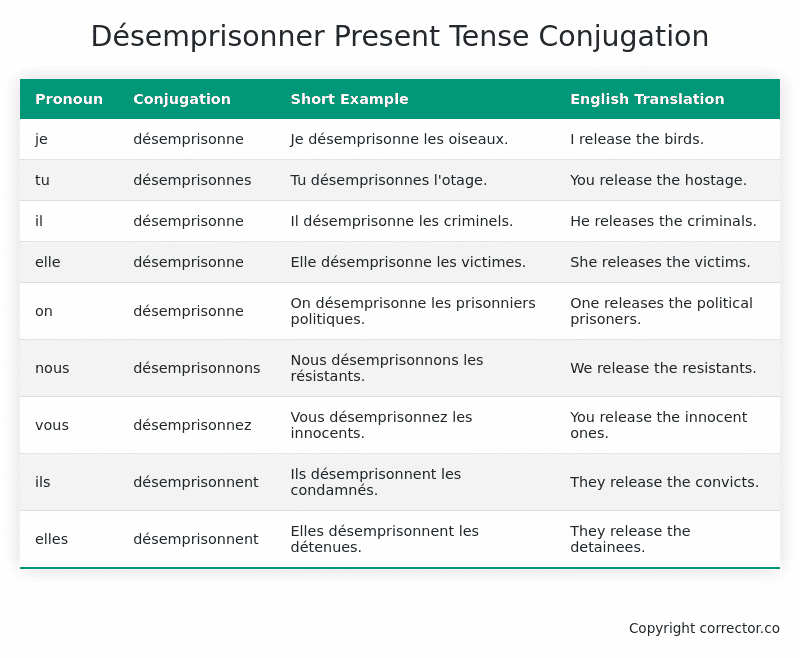Le Present (Present Tense) Conjugation of the French Verb désemprisonner
Introduction to the verb désemprisonner
The English translation of désemprisonner is “to release from prison” or “to free from prison.” The infinitive form désemprisonner is pronounced as “day-sahn-preez-oh-nay.”
Désemprisonner is a compound word derived from the prefix dés- (meaning “un-” or “release”) and the verb emprisonner (meaning “to imprison”). It is used in everyday French to refer to the act of liberating or setting someone free from prison.
Examples:
- Ils ont désemprisonné le prisonnier politique. (They released the political prisoner.)
- Le juge a désemprisonné l’accusé faute de preuves. (The judge freed the defendant for lack of evidence.)
- Nous espérons que le gouvernement désemprisonnera les prisonniers d’opinion. (We hope that the government will release the prisoners of conscience.)
Désemprisonner – About the French Present Tense
To take a deep dive into all the French tenses then see our article on Mastering French Tense Conjugation.
Common Everyday Usage Patterns For Le Present
Interactions with Other Tenses
Table of the Present Tense Conjugation of désemprisonner
| Pronoun | Conjugation | Short Example | English Translation |
|---|---|---|---|
| je | désemprisonne | Je désemprisonne les oiseaux. | I release the birds. |
| tu | désemprisonnes | Tu désemprisonnes l’otage. | You release the hostage. |
| il | désemprisonne | Il désemprisonne les criminels. | He releases the criminals. |
| elle | désemprisonne | Elle désemprisonne les victimes. | She releases the victims. |
| on | désemprisonne | On désemprisonne les prisonniers politiques. | One releases the political prisoners. |
| nous | désemprisonnons | Nous désemprisonnons les résistants. | We release the resistants. |
| vous | désemprisonnez | Vous désemprisonnez les innocents. | You release the innocent ones. |
| ils | désemprisonnent | Ils désemprisonnent les condamnés. | They release the convicts. |
| elles | désemprisonnent | Elles désemprisonnent les détenues. | They release the detainees. |
Other Conjugations for Désemprisonner.
Le Present (Present Tense) Conjugation of the French Verb désemprisonner (You’re reading it right now!)
Imparfait (Imperfect) Tense Conjugation of the French Verb désemprisonner
Passé Simple (Simple Past) Tense Conjugation of the French Verb désemprisonner
Passé Composé (Present Perfect) Tense Conjugation of the French Verb désemprisonner
Futur Simple (Simple Future) Tense Conjugation of the French Verb désemprisonner
Futur Proche (Near Future) Tense Conjugation of the French Verb désemprisonner
Plus-que-parfait (Pluperfect) Tense Conjugation of the French Verb désemprisonner
Passé Antérieur (Past Anterior) Tense Conjugation of the French Verb désemprisonner
Futur Antérieur (Future Anterior) Tense Conjugation of the French Verb désemprisonner
Subjonctif Présent (Subjunctive Present) Tense Conjugation of the French Verb désemprisonner
Subjonctif Passé (Subjunctive Past) Tense Conjugation of the French Verb désemprisonner
Subjonctif Imparfait (Subjunctive Imperfect) Tense Conjugation of the French Verb désemprisonner
Conditionnel Présent (Conditional Present) Tense Conjugation of the French Verb désemprisonner
Conditionnel Passé (Conditional Past) Tense Conjugation of the French Verb désemprisonner
Conditionnel Passé II (Conditional Past II) Tense Conjugation of the French Verb désemprisonner
L’impératif Présent (Imperative Present) Tense Conjugation of the French Verb désemprisonner
L’impératif Passé (Imperative Past) Tense Conjugation of the French Verb désemprisonner
L’infinitif Présent (Infinitive Present) Tense Conjugation of the French Verb désemprisonner
L’infinitif Passé (Infinitive Past) Tense Conjugation of the French Verb désemprisonner
Le Participe Présent (Present Participle) Tense Conjugation of the French Verb désemprisonner
Le Participe Passé (Past Participle) Tense Conjugation of the French Verb désemprisonner
Struggling with French verbs or the language in general? Why not use our free French Grammar Checker – no registration required!
Get a FREE Download Study Sheet of this Conjugation 🔥
Simply right click the image below, click “save image” and get your free reference for the désemprisonner present tense conjugation!

I hope you enjoyed this article on the verb désemprisonner. Still in a learning mood? Check out another TOTALLY random French verb present conjugation!


